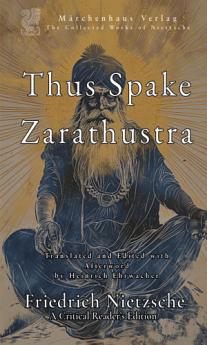Thus Spake Zarathustra: A New Reader's Edition
May 2024 · The Collected Works of Friedrich Nietzsche Book 32 · Marchen Press
Ebook
422
Pages
family_home
Eligible
info
reportRatings and reviews aren’t verified Learn More
About this ebook
"If you read Nietzsche's Zarathustra with attention and psychological understanding, you will see that he has described with rare consistency and with the passion of a truly religious person the psychology of the "Superman" for whom God is dead, and who is himself burst asunder because he tried to imprison the divine paradox within the narrow framework of the mortal man."Carl Jung, 1938 "Die psychologischen Aspekte des mutterachetypes" "Thus Spake Zarathustra" (German: Also sprach Zarathustra) is one of Nietzsche's most famous and influential works, presenting the philosophical journey of the prophet Zarathustra as he seeks to teach humanity about the overman (Übermensch) and the eternal recurrence of all things. The book is an exploration of themes such as power, freedom, and the transformation of human values through Nietzsche mythologized and abstracted ideal man. This philosophical novel is clearly in mimicry of Voltaire's Zadig, and follows the historical figure Zarathustra as he travels and teaches a new philosophy designed to save humanity from the impending Nihilism after the death of god. This trans-humanist perspective argues that humanness (including all morality) is a disease that must be abandoned. Written between 1883 and 1885, this work is a foundational text in Nietzsche’s philosophical corpus. Presented as a philosophical novel, it follows the protagonist Zarathustra, who descends from his mountain solitude to share his profound insights with humanity. The book is structured into four parts, filled with parables and discourses that articulate Nietzsche's key philosophical ideas, such as the Übermensch (Overman), the eternal recurrence, and the death of God. Through Zarathustra's teachings, Nietzsche explores the need for individuals to transcend conventional morality and create their own values in the pursuit of a more meaningful and authentic existence. First published in 1883 by E. W. Fritzsch in Leipzig, Germany, this new 2024 translation of the original 1883 German manuscript includes a new afterword by the translator, a timeline of Nietzsche's life and work, an index with descriptions of his key concepts, and summaries of his complete works. This translation is designed to allow the armchair philosopher to engage deeply with Nietzsche's works without having to be a full-time Academic. The language is modern and clean, with simplified sentence structures and diction to make Nietzsche's complex language and arguments as accessible as possible. This modern critical reader's edition offers a clear and accessible translation of Nietzsche’s original manuscript, using contemporary language and streamlined sentence structures to make his complex ideas easier to engage with. Designed for both general readers and students of philosophy, the edition includes a range of supporting materials to provide context and deepen understanding. These include an afterword by the translator discussing the historical reception and intellectual legacy of the work, an index of key philosophical concepts with emphasis on Existentialism and Phenomenology, a chronological list of Nietzsche’s published works, and a detailed timeline of his life, highlighting the personal relationships that influenced his thinking.
About the author
Friedrich Nietzsche (1844-1900) was a watershed German philosopher, cultural critic, poet, musician (briefly) and philologist (the study of ancient manuscripts) whose work has had a profound impact on modern intellectual history. Known for his critiques of European morality and religion (particularly Protestantism), Nietzsche's ideas on the "will to power" and the "Übermensch" have influenced a wide range of philosophical, literary, and psychological thought including thinkers such as Martin Heidegger, Albert Camus, Michael Foucault and the entire Postmodern religion.
Rate this ebook
Tell us what you think.
Reading information
Smartphones and tablets
Install the Google Play Books app for Android and iPad/iPhone. It syncs automatically with your account and allows you to read online or offline wherever you are.
Laptops and computers
You can listen to audiobooks purchased on Google Play using your computer's web browser.
eReaders and other devices
To read on e-ink devices like Kobo eReaders, you'll need to download a file and transfer it to your device. Follow the detailed Help Center instructions to transfer the files to supported eReaders.











